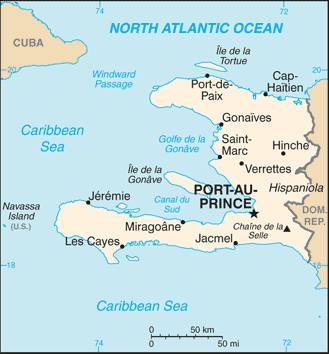America > Haiti: Weather, Map, Costs and Travel Guide

Haiti : When and where to go?
Click on a city for complete climate and weather tables
| Town | Jan | Feb | Mar | Apr | May | June | July | Aug | Sept | Oct | Nov | Dec |
| Port-au-Prince |  |  |  |  |  |  |  |  |  |  |  |  |
Haiti: Climate & Weather
The climate is tropical moist, and temperatures are high from one end of the year to the next, even if they are cooler in altitude.
Two rainy seasons mark the year, one between April and June, which is also the strongest, and the other between August and October.
The temperature of the water oscillates between 26 and 29 ° C.
The best time to visit the country is between November and March, temperatures are less warm and rains are rarer.
Weather today

Rain
Wind: 3 km/h
Precipitation forecast: 4,6 mm
> Full report and 7-days forecast
Data updated at 18:25 (local time)
At that time, the weather was:
 28 °C / Light Rain
28 °C / Light Rain
Haiti: Map

Sponsored links
What to do in Haiti
Inside the country, discover the deep forests surrounding the Pic de la Selle, the lakes and waterfalls of the Blue Basin, the village of Kenscoff in the southern peninsula with its special craftsmanship and the voodoo rites of the waterfall. 'Water.
As for the capital, Port-au-Prince, very lively, it has the reputation of sheltering many dangers: this does not prevent you to visit the market in Iron with a guide, nor to discover the cathedral of the Holy Trinity with Its amazing frescoes, or the Haitian Art Museum of St. Peter's College. There are also some sites which testify to a more splendid past for the country: the forts Jacques and Alexandre in Piétonville, the citadel La Ferrière not far from Cap-Haitien, the ruins of the Sans-Souci Palace in Milot.
Haiti: The basics
The current currency is the Gourde (HTG).
To get to Haiti, there are direct flights from Paris to Port-au-Prince.
For traveling in the country, it is possible to rent a car but the road network is not in very good condition, and moreover it is quite expensive. The best thing is to take a collective taxi, which can be recognized by its red cloth hanging on the rear-view mirror, or a tap-tap, a van that serves as a bus with established routes. There are also minibuses to go to the provinces.
The budget to envisage is not necessarily weak because the tourists can not hope to pay a hotel room less than 100 € on average. As for the meals, they are often delicious and quite cheap.
As for your health, it is advisable to have your universal vaccinations up to date and to add those against typhoid, hepatitis A and B and rabies. It is better to take treatment for malaria. Drink only bottled water.
For your safety, it is recommended to avoid the two largest cities of Port-au-Prince and Cap-Haitien due to the high crime rate and the frequent presence of firearms. It is better not to be in the border area with the Dominican Republic. As a general rule, keep away from the crowds, do not walk on foot especially at night, do not camp in mountainous areas, do not walk with cash.
From a climatic point of view, we must know that Haiti is affected very regularly by cyclones and earthquakes: you need to know the safety instructions for these circumstances.



